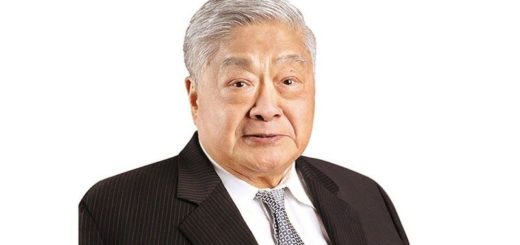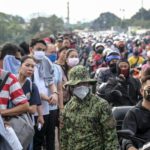Title VIII on The Accountability of Public Officers
Article 193. Public office is a public trust. Public officers and employees must at all times be accountable to the people, serve them with utmost efficiency, integrity, and loyalty, act with patriotism, and lead modest lives.
Directors and trustees, who represent the interests of the State in government-owned or -controlled corporations as well as persons appointed to official positions in said entities, are public officers.
Article 194. The President of the Republic and other members of the Council of State, the members of the Supreme Court of Justice, the members of the Constitutional Commissions, and the Ombudsman may be removed from office, on impeachment for and conviction of, culpable violation of the Constitution, treason, bribery, graft and corruption. The National Assembly shall have the power to initiate all cases of impeachment, and to constitute itself as a Tribunal of Justice in order to try and decide such cases. All other public officers and employees may be removed from office as provided by law but not impeachment.
A verified complaint for impeachment may be filed by any member of the National Assembly or by any citizen upon a resolution of endorsement by any of its members, which shall be included in the Order of Business within ten session days, and referred to the proper Committee within three session days. The Committee, after hearing, and by a majority vote of all its members, shall submit its report to the National Assembly within sixty session days from such referral, together with the corresponding resolution. The resolution shall be calendared for consideration by the National Assembly within ten session days from its receipt.
A vote of at least one-third of all the members of the National Assembly shall be necessary to affirm a favorable resolution with the Articles of Impeachment of the Committee, or override its contrary resolution. The vote of each member shall be entered in the journal.
In case the verified complaint or resolution of impeachment is filed by at least one-third of all the members of the National Assembly, the same shall constitute the Articles of Impeachment, and trial shall proceed.
No Tribunal of Justice proceedings shall be initiated against the same official more than once within a period of one year.
Before sitting for that purpose, each member of the Tribunal of Justice shall make a solemn affirmation in writing to do impartial justice according to the Constitution. Two identical originals of affirmation shall be executed, one of which shall be handed over to the National Assembly to be preserved in its archives, and the other be filed in the National Archives of the Philippines. When the President of the Republic is on trial, the President of the Supreme Court of Justice shall preside, but shall not vote. No person shall be convicted without the concurrence of three-fourths of all the Tribunal of Justice.
Judgment by the Tribunal of Justice shall not extend further than removal from office and disqualification to hold any office under the Republic of the Philippines, but the party convicted shall also be liable and subject to prosecution, trial and punishment according to law.
The National Assembly shall promulgate its rules for the Tribunal of Justice to effectively carry out the purpose of this section.
Article 195. In accordance with Article 234, the existing Sandiganbayan shall hereafter be known as the Anti-Corruption Court. It shall continue to function and exercise its jurisdiction as provided by law.
Article 196. The Office of the Ombudsman shall be composed of the Ombudsman, one overall deputy, and at least one deputy each for Luzon, Visayas, and Mindanao. A separate deputy for the military establishment may likewise be appointed.
Article 197. The officials and employees of the Office of the Ombudsman, other than the deputies, shall be appointed by the Ombudsman according to Civil Service Law.
Article 198. The Office of the Special Prosecutor shall continue to function and exercise its powers as provided by law, except those conferred on the Office of the Ombudsman.
Article 199. The Ombudsman and his deputies shall be citizens of the Philippines, and at the time of their appointment, at least forty years old, of recognized probity and independence, members of the Philippine Bar, and must not have been members of a political party or coalition for a period of not less than six months, and must not have been candidates for any elective office in the immediately preceding election. The Ombudsman must have at least been a judge or engaged in the practice of law in the Philippines.
During their tenure, they shall be subject to disqualifications and prohibitions as provided for in this constitution.
Article 200. The Ombudsman and his deputies shall be appointed by the National Assembly.
Article 201. The Ombudsman and his deputies shall have the rank of chairman and members, respectively, of the Constitutional Commissions, and they shall receive the same salary as the members, which shall not be decreased during their term of office.
Article 202. The Ombudsman and his deputies shall serve for a term of seven years without reappointment. They shall not be qualified to run for any office in the election immediately succeeding their cessation from office.
Article 203. The Ombudsman and his deputies, as protectors of the people, shall act promptly on verified complaints filed against public officials or employees of the Government, or any of its subdivision, agency or instrumentality, including government-owned or -controlled corporations, and shall, in appropriate cases, notify the complainants of the action taken and its result.
Article 204. The Office of the Ombudsman shall have the following powers, functions, and duties:
- Investigate on its own, or on complaint by any person, any act or omission of any public official, employee, office or agency, when such act or omission appears to be illegal, unjust, improper, or inefficient.
- Direct, upon complaint or at its own instance, any public official or employee of the Government, or any of its subdivision, agency or instrumentality, as well as of any government-owned or -controlled corporation with original charter, to perform and expedite any act or duty required by law, or to stop, prevent, and correct any abuse or impropriety in the performance of duties.
- Direct the officer concerned to take appropriate action against a public official or employee at fault, and recommend his removal, suspension, demotion, fine, censure, or prosecution, and ensure compliance with such action.
- Direct the officer concerned, in any appropriate case, and subject to such limitations as may be provided by law, to furnish it with copies of documents relating to contracts or transactions entered into by his office involving the disbursement or use of public funds or properties, and report any irregularity to the commission on audit for appropriate action.
- Request any Government agency for assistance and information necessary in the discharge of its responsibilities, and to examine, if necessary, pertinent records and documents.
- Publish matters covered by its investigation when circumstances so warrant and with due prudence.
- Determine the causes of inefficiency, red tape, mismanagement, fraud, and corruption in the government and make recommendations for their elimination, and the observance of high standards of ethics and efficiency.
- Promulgate its rules of procedure and exercise such other powers or perform such functions or duties as may be provided by law.
Article 205. The Office of the Ombudsman shall enjoy fiscal autonomy. Its annual appropriations shall be automatically and regularly released.
Article 206. A public officer or employee shall, upon assumption of office and as often as may be required by law, submit a solemn declaration of his assets, liabilities, net worth and annual income including the sources and application of funds. In the case of the Members of the Council of State, National Assembly, Supreme Court of Justice, constitutional commissions and other constitutional offices, and officers of the Armed Forces general or flag rank, the declaration shall be disclosed to the public through publication in newspapers of general circulation.
Article 207. The right of the State to recover properties unlawfully acquired by public officials or employees, from them or from their nominees or transferees, shall not be barred by prescription, laches, or estoppel.
Article 208. No loan guarantee, or other form of financial accommodation may be granted, directly or indirectly, by any government-owned or -controlled bank or financial institution to any public officials.




 I believe: This is a CoRRECT™ Video with a very positive message
I believe: This is a CoRRECT™ Video with a very positive message Walang Natira: Gloc-9's MTV Rap about the OFW Phenomenon
Walang Natira: Gloc-9's MTV Rap about the OFW Phenomenon

























